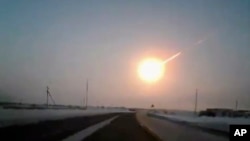Russian authorities say divers have explored an icy lake in search of fragments of the huge meteor that exploded above the Ural Mountains, but found nothing.
People in Russia's Chelyabinsk region panicked as the 10-ton meteor lit up the morning sky Friday and exploded with the force of at least 20 nuclear bombs.
The explosion unleashed a shock wave that blew out thousands of windows, damaged buildings and left more than 1,100 people injured. The Interior Ministry said most of the injuries were caused by flying glass.
The regional governor said the damage is estimated at $33 million.
The planetary science director at the U.S. space agency, NASA, says the event was an "exception."
Jim Green said Friday that "fireballs" of some kind happen on a daily basis, but most of them are not seen because they fall over the ocean or in remote areas.
The Russian Academy of Sciences says the meteor entered Earth's atmosphere at a speed of at least 54,000 kilometers per hour.
Its entry occurred just hours before an asteroid known as 2012 DA14 passed between Earth and some orbiting satellites.
NASA said the 45-meter-wide asteroid came as close as 27,000 kilometers above Earth.
People in Russia's Chelyabinsk region panicked as the 10-ton meteor lit up the morning sky Friday and exploded with the force of at least 20 nuclear bombs.
The explosion unleashed a shock wave that blew out thousands of windows, damaged buildings and left more than 1,100 people injured. The Interior Ministry said most of the injuries were caused by flying glass.
The regional governor said the damage is estimated at $33 million.
The planetary science director at the U.S. space agency, NASA, says the event was an "exception."
Jim Green said Friday that "fireballs" of some kind happen on a daily basis, but most of them are not seen because they fall over the ocean or in remote areas.
The Russian Academy of Sciences says the meteor entered Earth's atmosphere at a speed of at least 54,000 kilometers per hour.
Its entry occurred just hours before an asteroid known as 2012 DA14 passed between Earth and some orbiting satellites.
NASA said the 45-meter-wide asteroid came as close as 27,000 kilometers above Earth.











